Research
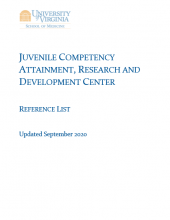
Reference List (2020)
The Juvenile Competency Attainment Research and Development Center seeks to stay abreast of clinical research and legal writing concerning juvenile adjudicative competency and provides the following reference list as a guide for lawmakers, researchers, and forensic evaluators. This list is updated regularly. However, should you believe an article should be included on this list, contact Dr. Janet Warren.
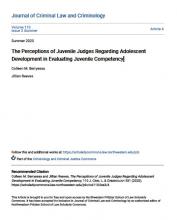
The Perceptions of Juvenile Judges Regarding Adolescent Development in Evaluating Juvenile Competency (2020)
The article presents data based upon semi-structured interviews as to how juvenile court judges respond to and consider psychosocial immaturity and the development of adolescents when making attributions of adjudicative competence of offenders in juvenile court.
Data show that the understanding of adolescent development do play a large role in shaping judges understanding of juvenile behavior – particularly related to emotional control, irrational behavior, lack of maturity, and social susceptibility – but most judges only connected these characteristics to juvenile offending.
Despite being aware of the juvenile’s exhibit attributes that diminish confidence – related abilities as part of their adolescent development, the majority of judges still stated that adolescent development is not important to them in assessing juvenile competency.
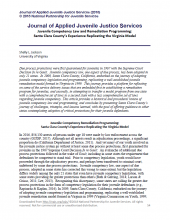
Juvenile Competency Law and Remediation Programming: Santa Clara County's Experience Replicating the Virginia Model (2018)
California legislature (WIC § 709) defines a minor to be incompetent to proceed "if he or she lacks sufficient present ability to consult with counsel and assist in preparing his or her defense with a reasonable degree of rational understanding, or lacks a rational as well as factual understanding, of the nature of the charges or proceedings against him or her."
In terms of the conditions that led to a finding of incompetence, the presence of an intellectual disability was identified in 75% of the youth ordered into remediation services in Santa Clara County either singularly or in combination with a mental disorder and/or age. Of the 10 youth who completed the remediation program in Santa Clara County, 7 were remediated, 2 were determined to be irremediably incompetent, and one case was dismissed. Youth remained in the formal portion of the program for an average of 245 days.
The author emphasizes that Santa Clara County's implementation of the juvenile remediation program would benefit from more planning for adequate staffing and training. Moreover, California legislature does not protect youth from self-incrimination, as does Virginia policy, which provided an ethical road block in the transfer of the Virginia model to Santa Clara County.
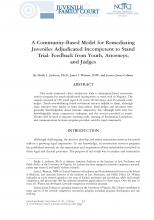
A Community-Based Model for Remediating Juveniles Adjudicated Incompetent to Stand Trial: Feedback from Youth, Attorneys, and Judges (2014)
Study included 130 youth, aged 8-21 years; 80 attorneys; and 43 juvenile court judges.
Youth overwhelmingly found remediation services helpful to them, indicating 9.25 agreement (on a scale of 1 to 10) with the statement "that the services were very helpful to them."
Both judges and attorneys were generally knowledgable about juvenile competency laws, although both were less knowledgable about the process used by competency evaluators and the services that were provided to the youth as part of the remediation process.
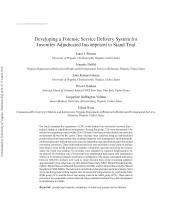
Developing a Forensic Service Delivery System for Juveniles Adjudicated Incompetent to Stand Trial (2009)
Out of 563 youth ordered into restoration services after judicial finding of incompetence, 72% were restored to competency, usually within 90-120 days of services provided in the least restrictive environment allowed by the courts.
No juveniles were admitted for inpatient hospitalization for the purpose of restoration services alone; five percent were admitted for the purpose of psychiatric evaluation or stabilization.
Rates of restoration varied based upon the impairment(s) identified with the youth: 47% of youth with an intellectual disability only, 50% of youth with mental illness and intellectual disability, 84% of youth with mental illness only, and 91% of youth with no mental illness and no intellectual disability.
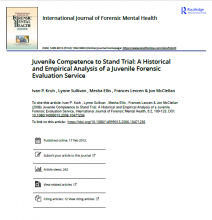
Juvenile Competence to Stand Trial: A Historical and Empirical Analysis of a Juvenile Forensic Evaluation Service (2006)
This study retrospectively examined characteristics of juveniles referred for competence evaluations in Washington State. This sample had higher levels of psychopathology and incompetence than in former studies.
This study found a high rate of agreement between examiners’ and judges’ competency opinions and examined variables associated with juveniles found incompetent versus juveniles found competent by judges. Juveniles who were found incompetent to stand trial by the courts were associated with having a younger age, intellectual impairments, a special education placement, and a diagnosis of psychosis.
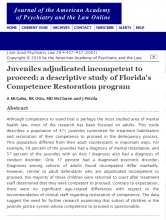
Juveniles Adjudicated Incompetent to Proceed: A Descriptive Study of Florida's Competency Restoration Program (2001)
This study examined 471 juveniles committed for treatment/rehabilitation and restoration of their competency to proceed in a delinquency process.
Each of the juveniles was placed in residential treatment in secure settings for an average of 217.5 days of restoration treatment per child. After this type of restoration effort, 71% of children were determined by the courts to have been restored to competency.
Ultimately, 44% of the juveniles with an intellectual disability without a co-occurring mental illness, 34% with a co-occurring mental illness and cognitive disability, and 8% with a mental illness only were found incompetent to stand trial after undergoing treatment.
For more information, please contact Janet I. Warren, DSW, Professor of Psychiatry and Neurobehavioral Sciences, Institute of Psychiatry and Public Policy, University of Virginia, [email protected], or 434-924–8305.

